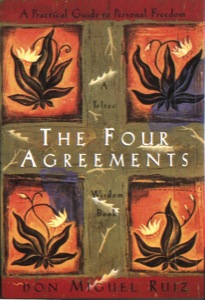
You know what happens when you assume! Often, we just assume wrong and it may not be pretty. However, if you assume I am continuing with our series on Don Miguel Ruiz’s The Four Agreements, you are absolutely right!
The Third Agreement is: Don’t make assumptions. Let me remind you of the first two agreements: One: Be impeccable with your word; and Two: Don’t take anything personally. Alisan Rowland has written about this third agreement while I was out of town. With her permission, here it is. Thank you, Allie!
According to Ruiz, we are constantly making assumptions about people and the world around us. For example, think about Valentine’s Day. How many of you have secretly wished someone knew you well enough to plan the “perfect celebration” for you without you asking for it or describing it?
The truth is that one of the myths of our culture is that if someone knows us really well and loves us, then they should automatically know what we want without us having to say a word. We often assume that those who know us should know what we need or want without us ever asking. Then we feel disappointed and get upset when the girl or guy of our dreams didn’t bring us a dozen long-stemmed roses, cook us a romantic dinner or take out the trash.
Ruiz describes how we can create a whole romantic fantasy relationship from one assumption that someone who smiled at us in the mall is interested in us. People often even get married assuming their spouse has the same beliefs about how to manage the household, the finances and raise children without ever finding that their beliefs are not the same. Then they find themselves in conflict as a result.
Or we get into a relationship with someone assuming that our love can change the person or fix his or her problems. Then we realize this person is not going to change.
But it’s not just our romantic relationships in which we make assumptions. We also make assumptions about our family, friends and co-workers. Often we assume our family members know how much we love them, so we may not tell them very often how we feel. Sometimes we assume that they have to put up with our bad behavior because they’re our family.
We might assume that a friend who hasn’t been in touch doesn’t care about us, without even knowing what’s been going on in that person’s life.

We make assumptions about our co-workers when they don’t approach a task the way we would or when they respond on the job in a way we just don’t understand. We assume that everyone else will react to a situation the way we do (that they see life the way we do) and we become confused when they don’t.
From our youth on, we tell ourselves stories about ourselves and other people and those stories limit our opportunities in life. They become the way we interpret events in our life.
We often make assumptions about ourselves and about people’s words and actions and don’t even realize we are doing it. Instead of asking someone what they really meant or finding out how someone feels about us, we feel vulnerable and we get so scared of being hurt that we would rather pull away from the person in order to protect ourselves.
Because we don’t want to feel vulnerable, we go to someone else and tell them our story with all of our assumptions as if it were fact. And so without even intending to, we find ourselves starting gossip and impacting other people’s relationships. What happens next? Drama ensues.
But if we can make so many assumptions without even realizing it and it becomes such an automatic part of our daily lives, why should we try to change? Why not just accept that this is just part of being human? After all, even Ruiz admits that it is difficult to stop making assumptions. Why should we try?
The Apostle Paul suggests from Romans 12 that the way to be transformed is through the renewing of our minds, which will help us to discern the will of God. How do we renew our minds? I believe we renew them through studying scripture, through practicing spiritual practices such as prayer and through reaching out to those people in need around us. I also believe that following Ruiz’s four agreements is a way to renew our minds.
Ruiz encourages us to ask questions instead of making assumptions, to ask for what we need or want, and to communicate clearly. Ruiz writes that we will need to practice this agreement if we want it to become our habit.
Sometimes it takes a big change in us to stop making assumptions. Is it possible? Is it worth it? I believe that it is. I believe that God offers us transformation through the renewing of our minds if we seek it. And with this transformation comes the ability to better understand God’s will for our lives and to live lives that reflect God’s love within us.
Rev. Dan Koeshall is the Senior Pastor at The Metropolitan Community Church (The Met) in San Diego, California, themetchurch.org











